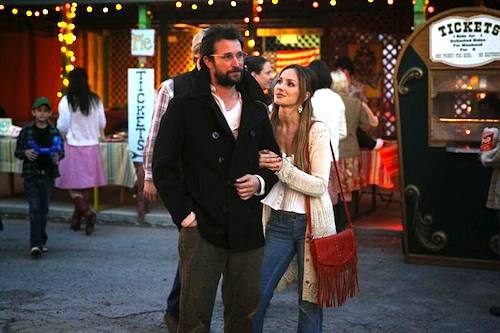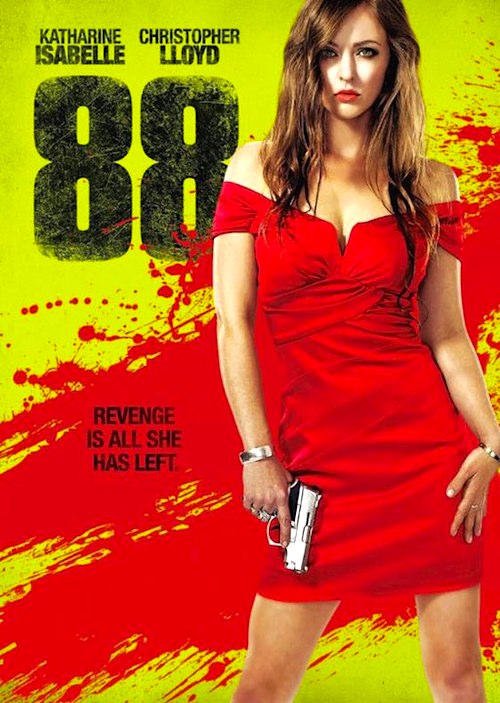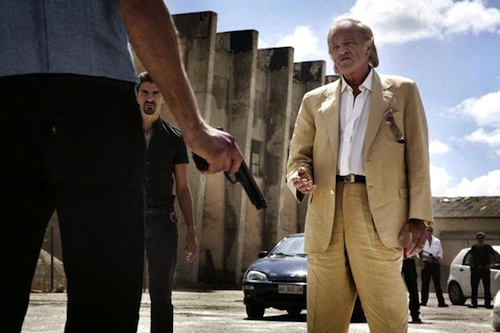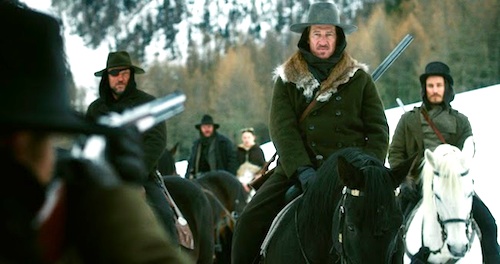By Joe Bendel. It’s the spigot theory that says a developing nation is better off without the discovery of a precious natural resource like oil, because it allows a corrupt central government (is there any other kind?) to control all economic activity at the source. That is sort of what Jeta Amata’s newly revised agit-prop film argues, but it is more interested in assigning blame. Yes, the multinational oil companies are at fault and so is our government and the Nigerian government, as well as the former regime it replaced. However, you are most to blame as an American consumer guzzling Nigerian oil, so go hang your head in shame—and don’t even bother with Amata’s Black November (known in a previous incarnation as Black Gold), because it is not worth your guilt-tripping time when it opens tomorrow in New York.
Oil executive Tom Hudson must be evil, because he is played by Mickey Rourke. However, the tables have just been turned on him when a group of one-man’s-terrorists take him hostage, demanding he use his influence to save their spiritual leader Ebiere Perema from the noose. If you are expecting a tense kidnapping film, then just move along, because November is really just one interminably long flashback, allowing the men with guns to explain how special Perema is, starting with her birth, of course. Mercifully, Amata spares us the Michenerian prologue explaining how geological processes formed the oil deposits in the river delta. Still, at least that would have been educational.
It is possible for nakedly didactic films to engage the audience on a cinematic level. Iciar Bollain’s Even the Rain is not exactly subtle, but it is still a distinctive work. On the other hand, you can safely say Black November is no Battleship Potemkin. Frankly, it is simply not professional grade. Amata may have come out of the Nollywood scene, but the handful of Nollywood films covered here all feature sharper character development and more polished scripts than November, and there is little difference in the quality of performances.

Embarrassingly, that includes a number of formerly big-name Hollywood actors turning up in small marginal roles, presumably so they could participate in a few press conferences to show they care. Nevertheless, November is notable for reuniting 9½ Weeks co-stars Rourke and Kim Basinger (playing “Kristy,” the journalist unwittingly filming Hudson’s kidnapping). One can imagine their on-set reminisces: “So, remember those ice cubes? Good times.”
According to the poster, Anne Heche is also in this movie. This is a pure guess, but maybe she plays one of the federal agents, as does Viveca Fox who briefly appears as “Angela,” the scoldy anti-terror agent constantly passing judgment on her superiors’ crassly Machiavellian ways.
November is counting on viewers cutting it a lot of slack, because of its supposedly good intentions, but when you are sitting through it, there is no getting around its low level of competency. It even fails on the fundamental level of propaganda. Perhaps out of some odd notion of narrative balance, Perema and her allies are constantly making inexplicably dubious decisions, but their cumulative effect is downright exasperating.
By the time it wraps up, the only lasting take-away from the film is the fact the hostage takers smuggled themselves and their guns up from Mexico, so it would seem the film is really advocating for increased border security. Black November is not recommended. It is not even presentable to a ticket-buying public, but it opens tomorrow (1/9) nonetheless at the Quad Cinema.
LFM GRADE: F
Posted on January 9th, 2014 at 10:08pm.




